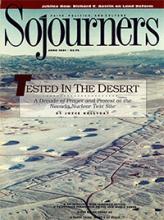Even a cursory review of the past 25 years reveals a vast change in almost every facet of life. Those of us whose stories span more than 35 or 40 years often identify "before" and "after" segments of our lives: "before the '60s/after the '60s," "before Vietnam/after Vietnam," "before the assassinations of 1968/after the assassinations of 1968." Sometimes we can pinpoint exactly when change ... transformation ... conversion occurred in our lives. And why.
From the moment I began to dig beneath the surface of the news -- about the war in Vietnam, the United Farm Workers' struggle, Allende's ouster in Chile -- I knew my worldview was drastically shifting. From the first inklings of understanding about liberation movements and a theology that enabled them, I knew that my way of life as a middle-class, white North American was being challenged at the deepest level.
Feminist thought in those "re-formative" years crept up on me and slowly dismantled -- then reshaped -- the fabric of my being with insights almost too profound to explain. As a woman striving to embrace the pain of others, especially those most impoverished and marginalized, I was reluctant to own my personal experience of injustice. Yet, the use of inclusive language, an equal opportunity to respond to vocation in church or society, and an end to all forms of exclusion by gender, all of which seemed necessary in a just society, were often glaringly absent in the Catholic world of which I was a part.
Read the Full Article
